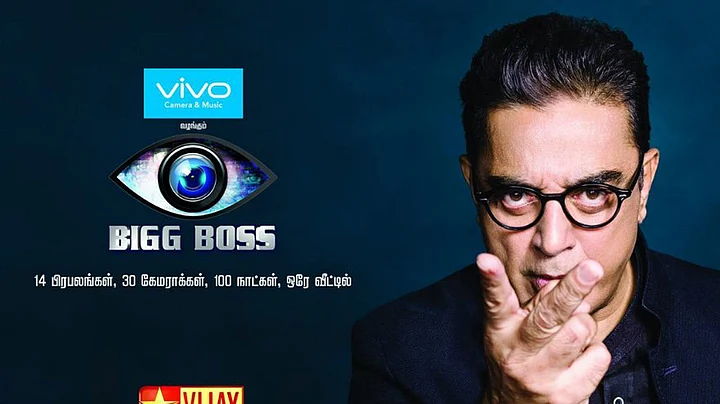For the 399th time, celebrities agree to be locked up together in a house for 100 days. Like its counterparts in over 54 regions across the globe, Bigg Boss (Tamil) hosted by Kamal Haasan, promises to proliferate the rash of ‘reality’ voyeurism on Indian television.
In 1997, a group of TV professionals from Endemol’s think tank brainstormed to create Big Brother, a reality show that would lock up a bunch of celebrities in a house for a 100 days. The social tension that ensues would be spliced into hour-long episodes of ‘slow TV’.
The Participants
The Tamil version of Bigg Boss has a few familiar faces. Anuya, Harathi, Vaiyapuri, Ganja Karuppan, Ganesh and Namita have all delivered memorable supporting roles in movies. The other contestants, one wouldn’t recognise even in a crowd. As has been the format across the globe, these celebrities are either B-listers or ‘have-beens’.
Because Bigg Boss has been a part of the Indian psyche for a decade now, all the participants are well aware of what sells, and how to up the show’s drama quotient.
Except for the first ever season of Big Brother (1999, Dutch), all the seasons that followed have compromised on the reality quotient.
Voyeurism
Voyeurism, in psychology, refers specifically to the urge to see someone naked, without the knowledge of the person who is seen. Typically, it is termed pathological (disease) when the need is exaggerated and is prolonged (for over six months).
'Voyeuristic tendencies’ refer to the trait where people ‘enjoy seeing what they cannot usually see’. This can range from the destruction wrought by a natural disaster, to the backstage drama of performers or contestants.
But the Big Brother/Bigg Boss format, and the sudden boom of reality television since 2005, has given birth to a new kind – ‘Mediated Voyeurism’.
...consumption of revealing images of, and information about others’ apparently real and unguarded lives, often yet not always for the purpose of entertainment but frequently at the expense of privacy and discourse, through the means of the mass media and Internet.
The original Big Brother in Dutch was high on sex and nudity. The US and UK versions televised loud arguments and fights among inmates. Bigg Boss in India followed suit with crass language and hyper-reactions to stage situations similar to the TV soap format. Bigg Boss (Tamil) and the soon to follow Telugu version, hosted by NTR Jr, will be similar mutations, where inmates who are fully aware of the format, walk in like babes in the woods.
Why It Will Work
Conservatively speaking, if one takes into account only the Indian franchises of global reality shows, we have been exposed to over 20,000 hours of programming already.
Fatigue has set in with the Big Boss format, as well as its off-shoots like Roadies and Splitsvilla.
Yet, the format will continue to garner eyeballs, for three distinct reasons.
1. Sensationalism: A contest between wannabe celebs, in which the viewers finally decide the stakes. Viewers live out interesting scenarios vicariously through the participants.
2. Sex: While not as explicit as the Dutch or Panama versions (yes, there’s a Panama version!), sexual tension between the inmates has always been a huge draw. Tanishaa and Armaan’s mollycoddles in Season 7 are a clear example.
3. Voyeurism: While mediated, and despite the fact that some of it is staged, an individual’s propensity for voyeurism runs deep. It has no psychological explanation thus far, but it is extremely widespread.
Tamil viewers haven’t caught on to the show yet. But knowing Star Vijay and its ability to twist a show enough to make it work, Bigg Boss-Tamil might just become the next Super Singer. But how this show is going to help Kamal Haasan in any way other than financially, is anyone’s guess.
(We all love to express ourselves, but how often do we do it in our mother tongue? Here's your chance! This Independence Day, khul ke bol with BOL – Love your Bhasha. Sing, write, perform, spew poetry – whatever you like – in your mother tongue. Send us your BOL at bol@thequint.com or WhatsApp it to 9910181818.)
(At The Quint, we question everything. Play an active role in shaping our journalism by becoming a member today.)
